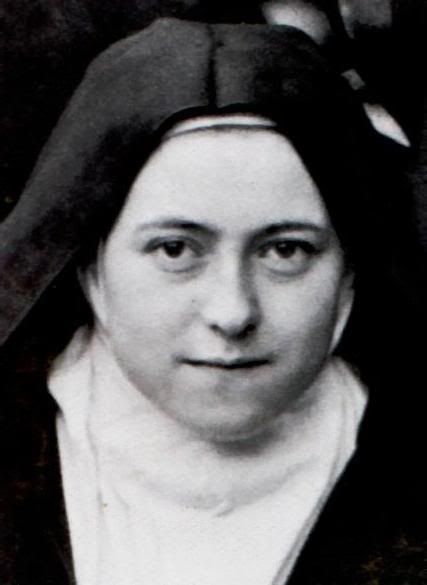 Today is the feast of Saint Thérèse of Lisieux, a contemplative nun who died in the convent at 24. Proclaimed a Doctor of the Church by Pope John Paul II in 1997, she used to be one of my least favorite saints. Now she's one of my favorites.
Today is the feast of Saint Thérèse of Lisieux, a contemplative nun who died in the convent at 24. Proclaimed a Doctor of the Church by Pope John Paul II in 1997, she used to be one of my least favorite saints. Now she's one of my favorites.When I was a child, the nuns and my mother were big on her: the "Little Flower" teaching her "Little Way." Just the sort of talk, and role model, to turn off any halfway-normal boy. Over the years, I learned about all sorts of well-attested miracles attributed to her intercession; but I assumed all that was for other people. Indeed that remains one of my spiritual challenges: I don't for a moment doubt that miracles occur as manifestations of God's love, but I still instinctively assume that others, not I, will experience them. Yet having perused her writings afresh, I've come to appreciate her profundity. In the eyes of God, we are all little boys and girls. We had better appreciate how, and adjust our prayer lives accordingly, if we are to enter the kingdom of heaven (cf. Matthew 18:3). And if we are to experience miracles here and now, too.
To that end, I recommend two written works: her now-classic autobiography of course, and a treatise about her by Vilma Seelaus, entitled Spirituality of Imperfection. I can relate to what I've learned from the latter. I think Protestants can too: it should cure them of any illusion that Catholicism is about works-righteousness.
Those initiated into her cult know that St. Thérése is associated with roses. Despite all the stories, I never quite understood why. But now I do.
Several weeks ago, a small but striking thing happened to me. I had had a miserably long and hot day at work and was despairing of my future as I fueled up at the nearest gas station. But when I approached the young, black, and female convenience-store cashier to pay for my fuel, she suddenly reached into my open-necked shirt and pulled from my chest hair a rose petal of whose presence I had been totally unaware. Wide-eyed, she said: "Somebody up there cares about you." I had to agree.




























